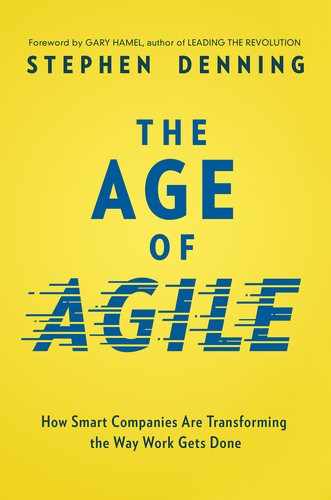FOREWORD
Bureaucracy is the default operating system for virtually every large-scale organization on the planet. Founded on the ideology of controlism, it elevates conformity above all other organizational virtues. Bureaucracy constitutes an organizational caste system that differentiates between the thinkers (managers) and the doers (employees). As a consequence, bureaucracy squanders enormous quantities of human initiative and imagination.
Today’s creative economy needs a radical rethink of our top-down, tradition-encrusted management principles and processes. The challenge: building organizations that are as innovative as they are efficient, as passion-filled as they are pragmatic.
This is not merely about implementing a new practice, process, or structure. Instead, we have to start with a new set of management principles, among which four are particularly vital: transparency, competence, localization, and upside.
Nucor, the most consistently profitable steel company in the world, practices radical transparency. Every single associate knows the profitability of every order that ships. At Nucor, it is the frontline employees, not managers, who are responsible for maximizing margins.
Empowerment also depends on competence. Take Morningstar, the world’s largest tomato processor. It has no managers and all key investment decisions are taken by individuals who in other organizations would be regarded as “blue collar” employees. Most of these employees are capable of sophisticated financial modeling—they can calculate the net present value and internal rate of return of new investments. Instead of moving decisions upward at Morningstar, they have moved competence down—to individuals who have the information and the context to make the best decisions.
If you want individuals to think and behave like owners, the organization must be decomposed into small, localized units—each with its own profit and loss (P&L) responsibility. All employees need to be able to see a direct line between their contribution and the profitability of the microbusiness in which they work. In large, monolithic organizations, there is little sense of accountability for results and little discretion in decision making. The result: employees who show up at work physically, but leave most of their discretionary energy at home.
Finally, if you want people to give their best, they must have an upside—that is, the possibility of personal and financial growth. In most organizations, fixed salaries and role definitions give individuals little incentive to do more than merely meet their targets. There is virtually no room for internal entrepreneurship.
These findings are entirely consistent with what Steve has observed in organizations that are committed to small, agile teams. Make no mistake, the management revolution is well under way. The only question for your organization is whether it is going to lead or follow.
—Gary Hamel
Professor, London Business School and
Director, Management Lab
